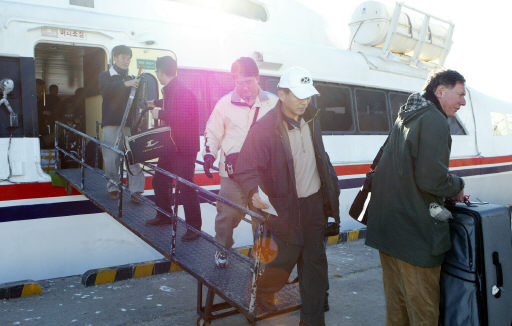Posted on : Jun.2,2006 11:50 KST
Modified on : Jun.2,2006 12:08 KST
 |
|
Members of the KEDO group arrive in North Korea January this year. (Yonhap News)
|
South Korea to foot cost of cleanup
The New York-based executive board of the Korean Peninsula Energy Development Organization (KEDO), an international consortium consisting of South Korea, the U.S., Japan, and the European Union (EU), announced the formal termination of its more than 10-year project to build a light-water reactor in Geumho, North Korea. Under the agreement of the consortium, Korea Electric Power Cooperation (KEPCO) will bear the entire liquidation cost for the project.
Seoul and KEPCO maintained that the state-run KEPCO will suffer no losses from the LWR project. Experts estimated the expenses KEPCO will shoulder at about 150-200 million USD. The major part of the liquidation cost is to settle damage claims from subcontractors on the now-cancelled project. KEPCO has so far injected a total of 830 million USD into the project, in areas of design, facilities, and turbine generator production.
The reactor facilities and turbine generators are half finished. To dismantle these facilities, KEPCO reportedly is considering three methods: to use them when constructing possible new reactors in North Korea, to use them to fill orders from abroad, or to recycle the parts when repairing existing domestic reactors.
Under the September 19 Joint Statement agreed to at the conclusion of the fourth round of six-party talks in Beijing last year, the nations discussing North Korea’s nuclear program said the issue providing light-water reactors to North Korea would be discussed "at an appropriate time." But in a statement immediately following, U.S. Assistant Secretary of State Christopher Hill announced the intent to end KEDO.
Some observers said that the parts may still be reused to build a new light-water reactor for the North. South Korean officials, of course, are refraining from comment; however, experts say that even finished parts left unused for more than five years are not safe to reuse, putting a time limit on the possibility of reuse to supply energy to the North.
South Korea provided a loan to KEDO of 1.14 billion USD through the Export-Import Bank in Seoul. North Korea was supposed to repay the interest-free loan to KEDO within 20 years. However, as the LWR project has been suspended, experts say there is no way to recover the money from North Korea. Even if the government decides to write off the loan, it still has to pay back civilians holding national treasury bonds. In this way, experts point out, the government will be at a loss due to the cancellation.

